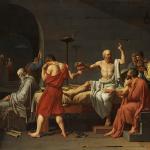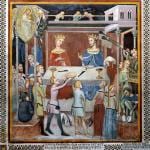 God is not, in fact, the Great Mary Sue.
God is not, in fact, the Great Mary Sue.
A “Mary Sue” is an overpowered character that a hack writer uses as a stand-in for his or her own persona.* Writing a fictional character in our own image is tempting, even for great authors. Dickens works out his marriage problems in more than one novel and while Dorothy Sayers may not have been Harriet Vane, eventually married to her great detective Peter Wimsey, she bore more than a passing resemblance. Neither author fell into the trap of making their characters all-knowing, all-wise, or perfect, so neither created a Mary Sue?
Recently a social media friend asked if God was not just a Christian “Mary Sue” to solve certain problems.
Turning God into a Mary Sue is one way of trying to solve problem.
Making God in our own image is a great temptation and the history of idol worship shows many of us fall into what the philosopher Xenophanes observed long ago:
168 The Ethiopians say that their gods are snub-nosed and black, the Thracians that theirs have light blue eyes and red hair. 169 But if cattle and horses or lions had hands, or were able to draw with their hands and do the works that men can do, horses would draw the forms of the gods like horses, and cattle like cattle, and they would make their bodies such as they each had themselves.**
The closer our image of God is to our own nature, the more convenient we find His opinions, the less likely they are to be true. The very odd thing about the Jewish insight was that we were made in God’s image and that we could not reduce God to a mere god. God is essentially other than we are. God chose to reveal Himself in the person of Jesus, the God-man. Jesus, in his death, burial, and resurrection, transcended all cosmic categories and united God and human in a wonderful relationship. This is all from God and all our gaze must be Godward through Christ. Jesus is fully man, but possessing two natures, divine and human, he is not less than we are, but so much more. He makes it possible for us to become little Christs: in His Image not in our own.
God in the Scriptures always is reminded us that God is not like us, cannot be reduced to us, or even held in the temples we make for Him. Whenever we are tempted to reduce God to fit a political or temporal agenda, then we are wrong. To paraphrase Lincoln in the Civil War, we hope to be on God’s side, not that God can be manipulated to be on our own team. God as God is essentially different from any human.
This is a discovery thinkers made over time as expressed in writings like Genesis or Isaiah. God is surprising, bigger than we dreamed. Just when one writer, say of I Chronicles, thought he saw what God was about, some other writer, say Habakuk, would push out the limits. God as God could not be made an image, because God was, is, and never will be a Mary Sue.
Philosophy added to our insight. We considered what would be the greatest possible being and named this being God. Is there an all-good? If there is, then that Being is nothing like us. If we say of a comic book hero (or a god), what if we can run faster, then of God we say: “What if one need not run at all? What if all our categories fail?” The revelation of the prophets, the hard experience of a people, came together with the insight of the philosophers.
God exists.
All our Mary Sue idols are nothing like that God.
*The term also appears to be used by some foolish folk who object to any powerful female character. I am reacting to the term as I defined it and as a commentator used it in reference to God.
**Kirk, G. S.. The Presocratic Philosophers: A Critical History with a Selcetion of Texts . Cambridge University Press. Kindle Edition.












